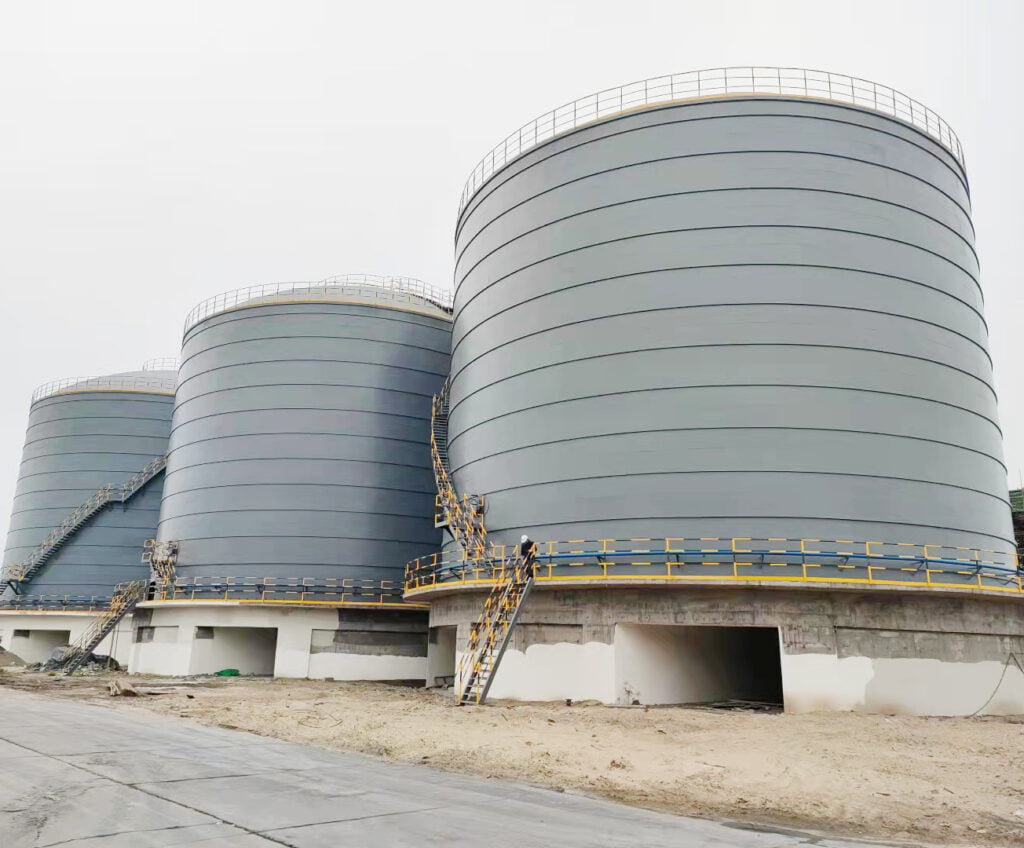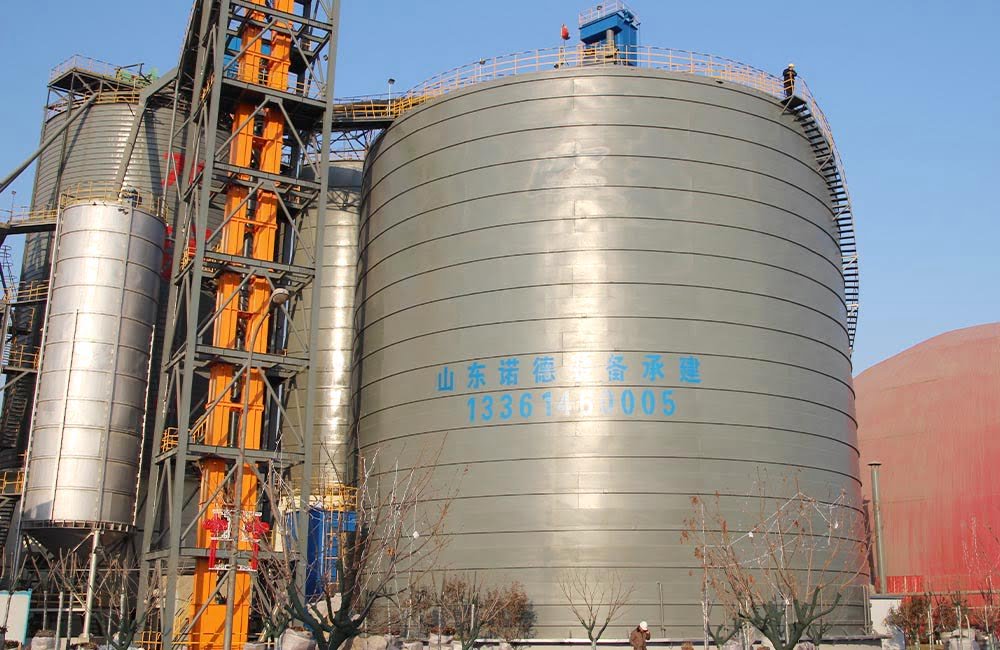介绍

In the realm of manufacturing, efficient storage solutions are paramount for seamless operations. One such solution gaining traction is the bulk storage silo. These towering structures offer a multitude of benefits, enhancing productivity, safety, and cost-effectiveness. In this blog post, we delve into the five key advantages of incorporating bulk storage silos into manufacturing processes.
增加存储容量
Bulk storage silos serve as expansive repositories capable of accommodating substantial volumes of raw materials, intermediate products, or even finalized goods. In stark contrast to conventional storage approaches like bins or drums, which are typically limited by their horizontal orientation, silos capitalize on vertical storage, thus maximizing the utilization of available space. This augmented capacity not only facilitates the efficient stockpiling of materials but also mitigates the need for frequent replenishments, consequently curtailing downtime within manufacturing operations. By leveraging the verticality of bulk storage silos, manufacturers can harness their storage potential to the fullest extent, thereby optimizing resource management and bolstering operational efficiency.
提高物料处理效率
Efficient material handling stands as a cornerstone in the realm of manufacturing, pivotal for streamlining processes and curbing wastage. In this context, bulk storage silos emerge as indispensable assets, orchestrating the seamless flow of materials within production facilities. Their design intricacies are tailored to facilitate the uninterrupted movement of materials, seamlessly integrating with automated retrieval and distribution systems.
This synergy ensures a frictionless transition from storage to production lines, obviating the need for manual intervention and mitigating the inherent risks of contamination or spillage. Through meticulous design and strategic integration, bulk storage silos not only optimize material handling processes but also fortify manufacturing environments against potential disruptions, thereby fostering a more resilient and efficient operational ecosystem.
增强库存管理
Effective inventory management serves as the lifeblood of operational efficiency within manufacturing contexts, acting as a linchpin for sustaining optimal stock levels and meeting dynamic production demands. Amidst this imperative, bulk storage silos emerge as catalysts for precision and foresight, offering a conduit for real-time monitoring of inventory dynamics. Equipped with sophisticated sensors and integrated monitoring systems, these silos provide manufacturers with a bird’s-eye view of consumption patterns and inventory levels, empowering them to glean actionable insights into replenishment schedules and resource allocation strategies.
The amalgamation of cutting-edge technology with traditional storage infrastructure enables manufacturers to transcend the constraints of manual inventory management, ushering in an era of data-driven decision-making and proactive resource optimization. By harnessing the power of real-time data analytics, stakeholders can anticipate fluctuations in demand, preemptively adjust inventory levels, and navigate supply chain uncertainties with newfound agility and resilience.
Furthermore, the remote accessibility afforded by integrated monitoring systems transcends geographical barriers, allowing stakeholders to oversee inventory operations from disparate locations. This remote oversight not only enhances operational flexibility but also fosters a culture of continuous improvement, as manufacturers can swiftly respond to evolving market dynamics and fine-tune their inventory management strategies in real-time.
Reduced Material Loss and Contamination

Traditional storage methods, such as utilizing open bins or leaving materials in uncovered containers, often expose stored goods to various environmental factors and contamination risks. These methods can lead to significant material loss due to spoilage or degradation. However, bulk storage silos provide a more secure solution by offering sealed and protected environments for storage.
By utilizing bulk storage silos, materials are shielded from moisture, dust, pests, and other contaminants that could compromise their quality. This safeguarding ensures the integrity of stored goods throughout the manufacturing process, reducing the likelihood of spoilage or degradation. As a result, companies can minimize waste and maintain consistent product quality, ultimately contributing to improved efficiency and cost-effectiveness in their operations.
Cost Savings and Return on Investment
While the initial investment in bulk storage silos may seem substantial, the long-term benefits far outweigh the costs. By optimizing storage space, minimizing material waste, and enhancing operational efficiency, silos contribute to significant cost savings over time. Moreover, the improved inventory management and reduced downtime result in higher productivity and profitability, providing a favorable return on investment for manufacturers.
| Benefits of Bulk Storage Silos | Explanation |
|---|---|
| Optimized storage space | Bulk storage silos efficiently utilize vertical space, allowing for maximum storage capacity within a limited footprint. |
| Minimized material waste | Silos enable better control over inventory, reducing the risk of material spoilage or contamination, thereby minimizing waste and associated costs. |
| Enhanced operational efficiency | With streamlined material handling processes, silos facilitate faster loading and unloading, reducing manual labor requirements and operational downtime. |
| Improved inventory management | Silos offer real-time monitoring of inventory levels, enabling manufacturers to maintain optimal stock levels and avoid stockouts or excess inventory. |
| Higher productivity | By ensuring a consistent supply of materials and reducing downtime for refilling, silos contribute to increased overall productivity in manufacturing operations. |
| 提高盈利能力 | The combined benefits of cost savings, improved efficiency, and enhanced inventory management directly contribute to higher profitability for manufacturers. |
| Favorable return on investment (ROI) | Despite the initial investment, the long-term advantages of bulk storage silos result in a positive ROI, making them a sound investment for manufacturers. |
结论
In conclusion, bulk storage silos offer a multitude of advantages for manufacturers seeking to optimize their storage and handling processes. From increased storage capacity and improved material handling efficiency to enhanced inventory management and cost savings, the benefits are undeniable. By embracing the versatility and functionality of bulk storage silos, manufacturers can elevate their operations to new heights of efficiency and competitiveness.
常问问题
Q: What are the main factors to consider when selecting a bulk storage silo for manufacturing?
A: When choosing a bulk storage silo, key factors to consider include the type of material to be stored, storage capacity requirements, available space, environmental conditions, and compatibility with existing handling and retrieval systems.
Q: Can bulk storage silos be installed outdoors, or are they strictly for indoor use?
A: Bulk storage silos can be installed both indoors and outdoors, depending on the specific requirements of the manufacturing facility and the environmental conditions. Outdoor silos may require additional protection against weather elements and may have different structural considerations compared to indoor silos.
Q: How do bulk storage silos contribute to environmental sustainability in manufacturing?
A: Bulk storage silos help minimize material wastage and contamination, reducing the environmental impact of manufacturing operations. By providing sealed and protected storage environments, silos prevent spills, leaks, and spoilage, promoting efficient use of resources and reducing the need for waste disposal.
Q: Are there any regulatory requirements or safety standards that apply to the installation and operation of bulk storage silos?
A: Yes, manufacturers must adhere to relevant safety regulations and industry standards when installing and operating bulk storage silos. These may include guidelines for structural integrity, material handling practices, fire safety measures, and environmental protection. Compliance with regulatory requirements ensures the safe and responsible operation of bulk storage silos.




